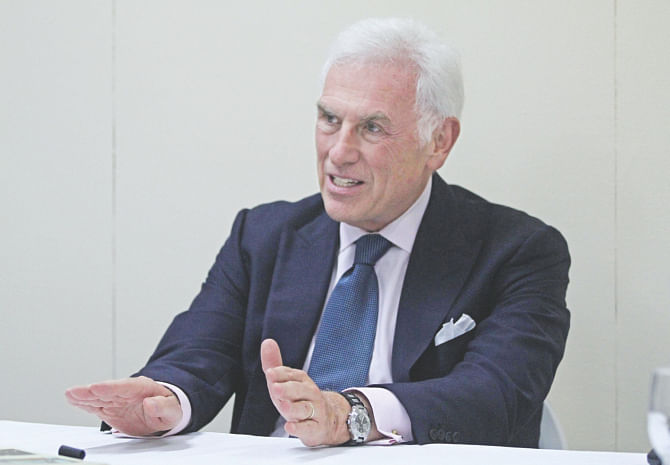Bangladesh is a growth model for its resilience
Bangladesh is a growth model for its resilience
ICC Secretary General John Danilovich talks about the country's role in global trade

Bangladesh is a model country for the rest of the world thanks to its resilience and the continuous economic growth in the face of crisis, said the secretary general of the International Chamber of Commerce (ICC).
"Bangladesh is no longer a test case for development as suggested by economist Just Faaland a few decades ago," John Danilovich said. Faaland had said, if Bangladesh can develop, any country could.
In the recovery path of the global economy from recession, the Asian nations, especially Bangladesh, played a vital role, Danilovich told The Daily Star in an interview in Dhaka recently.
The former US diplomat came to Bangladesh to join the celebration of the 20th anniversary of the International Chamber of Commerce-Bangladesh (ICC-B), the local unit of the world business organisation.
During the conversation on the global economy's recovery from recession that started from the US sub-prime mortgage in 2007, Danilovich said the whole world has not recovered yet.
“The recovery is still patchy, but the South Asian nations have played a key role in the recovery process,” he said.
"Bangladesh performed extraordinarily even during the recession riding on its garment exports."
He said most Asian nations remained unhurt from recession for their excellence in exports. “Exports of the Asian nations were very strong.”
On sustainability of the export-led growth model, the ICC top official said exports would grow further as the Western economy is recovering gradually from the slowdown.
“The governments of the Asian countries should invest more in job creation and infrastructure for the sustainability of the export-led economic growth,” Danilovich said.
Regarding China, the world's second largest economy after the US, he said the country has a big role to play in lifting the rest of the world out of the crisis, as the country is still growing at a healthy pace.
"China is a member of the World Trade Organisation (WTO). So it is an advantage for the rest of the world as the country will be able to show the path to boost global trade," he said.
For a balanced global economic growth, the gap between the developed countries and the least developed countries (LDCs) has to be narrowed through the application of different trade tools.
However, there is no quick fix for the problems, he added.
As part of the measure to trim the gap, trade facilitation, an agenda that was adopted by the member states of the WTO in its ninth ministerial conference in Bali last year, can be a good tool to boost economic growth in the LDCs, he said.
"The implementation of the trade facilitation will save $1 trillion globally through simplification of the customs and administrative costs worldwide."
Such a huge saving will create jobs for 21 million people worldwide, especially in the LDCs.
Danilovich also touched upon the discriminatory duty structure in the US market for Bangladesh's garment items.
Currently, Bangladesh pays 15.61 percent duty on the export of apparel items to the US, whereas China pays only about 3 percent duty on its exports of apparel items to the world's largest economy.
The US customs allows duty-free entry to 97 percent Bangladeshi products, but the offer does not cover garment, which accounts for 80 percent of the country's incomes from exports and is a lifeline of the economy.
As a result, garment exporters paid nearly $828 million in 2013 and $3.41 billion in the last five years as duties to the US, according to the commerce ministry.
"Bangladesh has been paying the duty to the US market despite being an LDC. This is not good," said Danilovich.
“The WTO should address the issue of duty on the export of garment items to the US. If the WTO members agree to trade facilitation, such a disparity might be minimised to some extent,” he said.
He said the effective adoption of trade facilitation by the WTO member countries would remove the bureaucratic tangles in global trade.
Danilovich also opined for a true free trade regime in the world for balanced economic growth.
“The main objective of establishing the ICC was to ensure peace in the world through trade. Through free trade, we can ensure inclusive growth and more peace.”
On formation of the Trans-Pacific Partnership (TPP) trade agreement that the US is negotiating with 11 other countries throughout the Asia-Pacific region (Australia, Brunei Darussalam, Canada, Chile, Japan, Malaysia, Mexico, New Zealand, Peru, Singapore, and Vietnam), he said if the deal is struck, Bangladesh can join later with the trade bloc.
“It is believed that a new order in the world trade scene would be in place with the signing of the TPP."